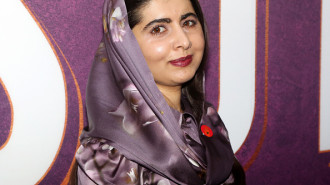Outcry in Oman as two activists jailed for 'blasphemy', in 'trumped up charges'
Two Omani activists have been handed prison terms over social media posts and WhatsApp messages that authorities have described as "blasphemous", sparking an uproar in the Gulf country over issues of free speech.
The activists, Maryam Al-Nuaimi and Ali Al-Ghafri, were sentenced on Tuesday to three and five years in prison by the Sohar Court of Appeal. They were also charged with misuse of social media.
The court also acquitted activist Ghaith Al-Shibli for lack of criminal responsibility, and moved another Omani national's case, Abdullah Hassan, to a specialised court.
Al-Shibli was previously charged with "insulting and offending the Divine Essence" and "using the internet to incite and tempt the commission of debauchery", over a tweet about alleged government corruption.
The message contained a minor reference to the Prophet Noah, which appears to be the section of the complaint used by prosecutors.
All four were arrested between 24 July and 2 August last year for taking part in online discussions about freedom of thought, in what has been dubbed 'The Ghaith Spaces Case'.
They were then released on bail in October while their trial continued.
The court also confiscated the defendants' mobile phones and ordered the closure of their Twitter accounts at the time of their arrest.
#محاكم_التفتيش الإلكترونية لم تعد فقط معنية بما ينشر في الحسابات العامة، وإنما حتى في الواتساب والمحادثات الخاصة.. هذه سابقة خطيرة وفيها انتهاك صارخ للخصوصية وهذا أمر محرم شرعاً وقانونا، المساحات الخاصة لها حُرمات.. علماً أنها ليست بغرض النشر ولم تحدث في الفضاء العام وإنما الخاص!
— علوي المشهور (@alwi_999) June 9, 2022
Activists online have condemned the sentencing, with hashtags calling for the activists to be freed trending, as well as #Freedom_for_prisoners_of_conscience. Others said that their sentencing sets a dangerous precedent in the Sultanate.
The verdict was based on evidence falling within the scope of the defendants' private information and online conversations, constituting a breach of their privacy, the Omani Centre for Human Rights (OCHR) said.
Thirty-year-old Al-Nuaimi was alleged to have sent WhatsApp messages suggesting that "religions are patriarchal", and was charged with "insulting monotheistic religions".
Women's rights groups have launched a campaign calling for the release of Al-Nuaimi, who alleged that her phone was forcibly confiscated during an arbitrary investigation.
Al-Nuaimi was subjected to solitary confinement, endangering her psychological and physical health, they added.
انطلقت اليوم على توتير حملة داعمة للناشطة النسوية مريم النعيمي التي اعتقلت بسبب أربع كلمات ذُكرت على الواتساب الخاص بها، اسُتخرجت من هاتفها عند التحقيق التعسفي معها. 1/2#سلطنة_عمان #شريكة_ولكن #الحرية_لمريم_النعيمي pic.twitter.com/foVK6q2ETo
— Sharika wa laken (@Sharika_walaken) June 9, 2022
Meanwhile, Al-Ghafiri was sentenced for "insulting and offending God", according to the Gulf Council for Human Rights.
The human rights organisations have denounced the activists' sentencing, calling it a violation of their rights to freedom of expression, both online and offline.
Both groups also called for the sentences to be overturned, as well as a halt to the prosecution of online activists.
They also demanded the repealing of Article 269 of the Omani Penal Code and any other legal text that violates public and individual rights and freedoms.
Freedom of expression is extremely restricted in the Sultanate, says Amnesty International, and authorities have detained several activists in recent years over perceived criticism of government policies.
Radio show 'All Questions' was shut down over an interview conducted with a Shura Council member, who criticised the head of the body.



